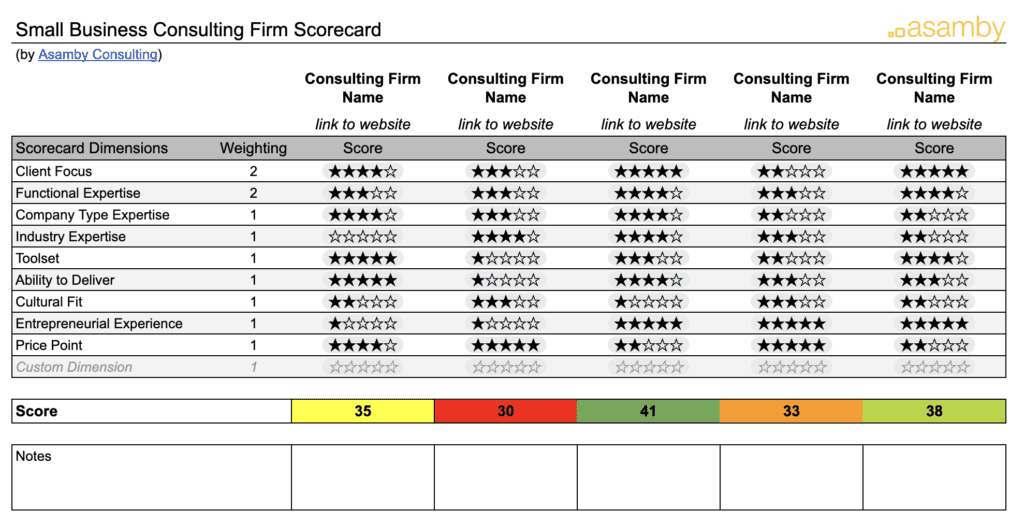
If you’re exploring working with a small business consultant, you will need to vet potential candidates.
This article outlines how to vet a small business consulting firm.
The dimensions by which to vet a small business consulting firm are:
- Client Focus
- Functional Expertise
- Company Type Expertise
- Industry Expertise
- Toolset
- Ability to Deliver
- Cultural Fit
- Entrepreneurial Experience
- Price Point
The Small Business Consulting Firm Scorecard
When vetting a small business consulting firm, you will assess the factors mentioned above. Also, these factors will have different importance to you.
Use a scorecard, in which you apply scores to each firm. These scores are weighted by how important a certain assessment is to you.
Find our free, fully customizable scorecard template here.
Next, let’s dive into the assessment dimensions.
Client Focus
When you hire a small business consulting firm, what you’re looking for is change. A change in the way your business operates, a change in your growth trajectory or any other area of your business that you’re trying to improve.
To achieve that change, client focus of the consultant will be critical.
Tailored approaches
Firstly, what you want is a partner that solves your problems specifically. You’re not looking for a cookie cutter program that you run through, but for someone that specifically looks at your problems.
Implementation support
Contrary to corporate consultants, you should find a consultant that offers you support in implementation. You likely not only are looking for know-how, but also for an additional pair of hands when it comes to implementing.
Looking for a small business consulting firm? Book a free consultation here.
Look for a client that’s with you along the way, not only delivers a glossy slide deck with recommendations.
Again, what you’re looking for is change and improvement. Not deliverables.
Accountability and Coaching
For small businesses, support in accountability and leadership coaching can be highly beneficial. After all, you as the CEO or founder have built the company to this point. So any change in the way your business is run will need to start with you.
Alongside implementation, keeping you on track and accountable is a make-or-break success factor for a successful engagement.
The dimension of client focus should be weighted rather significantly.
Functional Expertise
The consulting firm you hire needs to have deep functional knowledge about the problems you’re trying to solve. Specifically in operations and organization, functional knowledge often trumps industry know-how.
Functional expertise will often mean that the consultant has worked on the issues you’re facing before.
Knowing what has worked and what hasn’t for other clients is a crucial part of the benefit you’re paying for.
Here are some examples of questions to assess the functional expertise of the consultant:
- Has the consultant worked on and solved the problem you’re facing before
- Does the firm have experience with the software you’re looking to implement
- Do they have experience in creating lasting impact
Try to really understand if the consultant has the functional experience that you’re looking for.
Functional experience is another priority in assessment and should be weighted accordingly.
Company Type Expertise
Next, assess whether the consultant has worked with your type of company before. Most importantly, company size: Driving change in small business is way different from delivering value to enterprise clients.
Also, if you’re a remote-only company, the consultant should have worked with that type of company before.
The more similar the consultant’s past client base is to your business, the more likely they are to understand your pain points and have solutions for them.
Industry Expertise
Industry experience is very important in some forms of consulting, specifically in strategy consulting. Working on positioning, go-to-market strategies or other strategic questions requires the consultant to understand how the industry works.
In other cases, like operations or organizational consulting, the industry expertise may play a smaller role, while still relevant.
Operational and organizational problems are more rooted in the nature of your business than in the challenges of your industry.

Toolset
During the vetting process, try to gauge whether the small business consulting firm has a well-developed toolset.
This might include approaches to specific problems, as well as tools that they either use with you or even hand over to you and your team.
The more developed the toolset, the quicker the turnaround time of creating change.
Lastly, a well developed toolset typically includes the learnings from past projects, so you can be sure to benefit from the past experience of the consulting firm.
Ability to Deliver
When hiring a consultant, you want to make sure that they can deliver.
Ability to deliver is typically a function of number of team members and their availability, as well as quality of toolset.
If you’re working with an individual contractor, make sure they have and allocate enough capacity to your project.
If you’re working with a boutique firm, try to understand the quality of people that will actually be assigned to the project.
Cultural Fit
The initiatives that you work on with the consultant will drive cultural change. In addition, the consultant will likely work not only with you, but also with your team.
For these reasons, it’s critical that there’s a good cultural fit between you and the consultant.
This will help with finding solutions that sit well with the team, creating an effective working relationship with the consultant and developing your business further in line with your plans, aspirations and vision.
Entrepreneurial and Leadership Experience
An optional point, but a strong asset if available: Check if the consultant has either run their own business or managed one before.
When someone has their own experience in the issues you’re facing, it will speed up communication and lead to better results.
What you’re getting is a partner on eye-level.
Price Point
Last but not least, the price point. Assess how the small business consulting firm structures their pricing and engagements.
If you have a well-defined scope of work, a project-based approach can work.
But more often than not, a retainer-based engagement is more favorable. You’re looking to create change, and change is a process, not a point in time.
Time-and-material engagements aren’t advisable, as they create zero commitment; not for the consultant, and more importantly, not for you.
Also, check the terms of the engagement. Is there an easy way to end the engagement if it’s not a good fit?
Is there a way to assess the quality of work first, in some smaller initial engagements?
Try to get a good understanding of payment terms and total cost of the engagement.
Download our Free Small Business Consulting Firm Scorecard to assess your shortlisted candidates.
Reviews, Testimonials and Reference Checks
Lastly, use your peers to assess the quality of the consulting firm.
Check reviews online to see how happy past clients were. Look for testimonials and case-studies for a more in-depth understanding of past engagements.
And lastly, and this is the strongest tool you have to validate your impressions of the firm, ask if they can share contact information from past clients.
Most fellow business owners are happy to share if they liked working with someone, and even more so, when they didn’t like it.
Use these dimensions and our free scorecard to assess the consulting firms you’re speaking to. Finding the right firm will save you money, headaches and most importantly, create the results you want for your business.
